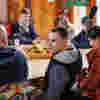The Social Change Fund
We fund sustainable projects that build connections and confidence for people who are blind and vision impaired.

Applications for this funding round are now closed. Keep checking our website and social media channels for upcoming rounds.
What are the funding criteria?
We’re looking for bright ideas to leave a sustainable, lasting impact.
Ideally, we also want the projects we fund to gather evidence about what kind of changes will make a real difference in the lives of blind and vision impaired people. Our long term goal is to bring about broader social change.
We’ve designed our grant-making to have a sustainable impact at three levels:
- Individual: We fund projects and programmes that make a positive difference to people who are blind and vision impaired.
- Sector: We build partnerships and connections that improve the resilience of community organisations to step up for blind and vision impaired people.
- Societal/systems: We commission research into what it means to be blind or vision impaired. We support and encourage the projects we fund to monitor and report impact to share with others seeking to drive change.
Why children and young people?
Our recently published ‘Outside report’ has shown that loneliness and isolation affects vision impaired people more than both the general and disabled populations. More specifically, it has become increasingly apparent that vision impaired children and young people are experiencing, or are at greater risk of experiencing, particularly severe levels of loneliness and isolation. Our findings demonstrate that having a visual impairment can make it harder for children to learn from other family members and connect with others around them. Rehabilitation and educational support varies significantly across the country, and personal resilience and self-advocacy becomes challenging without the relevant support networks and life skills.
As a responsive funder, we are committed to supporting projects that impact positively on the journeys of vision impaired children and young people, and that provide them the best life chances and equity in society. We want to drive change, but we also want them to be part of that journey, and for them to feel supported and validated in both the decisions they make, and throughout the projects’ delivery.
What do we want to fund?
Our research shows that a lack of confidence means that some people self-isolate. Do you have an idea or project to build confidence among people who are blind and vision impaired?
We are keen to fund projects that address three key priority areas:
Social Connections
• Programmes that encourage children and young people to forge long-lasting friendships and connections over time. This could involve connecting vision impaired children with one another based on shared interests or with sighted young people in their communities.
• Programmes that develop social skills that will ultimately facilitate and increase connections confidence in getting out and about, interacting in different places and with different people, engaging in group activities and pursuing hobbies and interests. This might be through creative or cultural activities. .
• Physical activities, including exercise and sports-based programmes that bring people together and facilitate improvements in well-being, resulting in young people feeling more confident and physically comfortable in getting out and about and being active.
Digital Inclusion
• Programmes that increase young people’s confidence in using technologies that can facilitate independence when out and about. This could include training and / or demonstrations of navigational apps.
• Projects that use technology in innovative ways to improve self-confidence and encourage creativity and connection. This might include programmes to experiment with podcast creation, video editing, or experimenting safely with social media.
• Projects that provide technology training to lay foundations for employment and volunteering opportunities.
Personal Resilience and Self-advocacy
• Programmes that equip children and young people with the skills to confidently and safely navigate different environments, and interact with others, including articulating the reasonable adjustments or support they need.
• Workshops for parents and families to explore entitlements for younger children in education and beyond, and to offer advice for accessing different levels of support.
• Services to help children and young people and their families through specialist counselling or psychological support.
This is not a definitive list of projects: we very much welcome applications that present additional innovative and creative ideas for projects under these three key priority areas.
Am I eligible?
The social change fund supports organisations who directly support blind and vision impaired people or people at risk of losing sight.
All sizes: Don’t be put off applying if your organisation is small. We can help you achieve change. We’re keen to hear from organisations of all sizes that are based in the community, people-powered, and are working to achieve local change.
All locations: We know there are gaps in support around the UK for blind and vision impaired people. If you’re working in a part of the country where it feels like there’s a gap, we’re particularly keen to hear from you.
All types of impact: If your work is not solely focused on vision loss, get in touch. What matters is that projects must be inspired by the needs of, and barriers faced by, blind and vision impaired people, and plan to make a real difference to their lives.
We fund the types of organisations:
- UK registered charities
- Registered Charitable Incorporated Organisations (CIO)
- Charitable companies, limited by guarantee
- Community Interest Companies (CIC), limited by guarantee
- Exempt charities (e.g. educational establishments)
How much can I apply for?
Our funding is open to organisations from across the UK, and will provide grants of up to £30,000.
How to apply
Please upload a project proposal of up to 750 words in Microsoft Word format. For proposal guidelines, please see here.
To apply, you'll also need to fill out our online application form which you can find here.
How are funding decisions made?
We look at the proposed projects and what difference they plan to make, and how they will be able to evidence this. We are an evidence-led funder, and we base our decisions on where our funding will have the greatest impact.
We have a Social Impact Grants Assessment Panel (SGAP), an advisory committee to advise on the grants we give.
The committee is made up of experts by experience who bring their different professional backgrounds to our grants assessment process.
They are all committed to a fairer future for blind and partially sighted people and give us independent advice.
How do I apply? What information do I need?
Our guidance for applying page has all the information you need to help with your application.
Examples of previous projects
You can find out more about some of the projects we have funded, by reading our impact stories.
Supporting people experiencing domestic violence
One project we’ve funded has helped to improve safety for blind and vision impaired people experiencing domestic violence. Regional charities Beacon Vision and Dudley-based domestic abuse charity CHADD worked with people with lived experience to do accessibility audits on refuge spaces. They used this information to develop a toolkit to improve accessibility in refuges.
They designed the toolkit to share UK-wide so others can benefit from their work. The toolkit is the first of its kind and is designed to give charities and agencies all the knowledge they need to ensure refuge spaces are as accessible as possible to people who are blind or vision impaired.

“By equipping refuges with the knowledge and resources they need, we can help break down barriers and ensure that all survivors of domestic abuse can easily access the assistance and care they deserve.”
Tackling loneliness through farm visits
We’re helping young people who are blind and vision impaired to thrive by funding the charity LOOK UK to deliver farm life experiences with Jamie’s Farm.
People who are blind and vision impaired, and especially young people, are more likely to experience loneliness and isolation than the general population. The farm visits gave them the opportunity to spend time with other visually impaired people, get to know new people, and to take part in new activities.

“We are hoping to give young people the opportunity to make friends, try something new, boost their confidence, and feel the benefit of being in nature.”
How can I get help with my application?
We’re here to help. Contact our grants team by emailing socialchange@fightforsight.org.uk
-
Funding criteria
-
Eligibility
-
Process
-
Case studies
- Funding criteria
- Eligibility
- Process
- Case studies